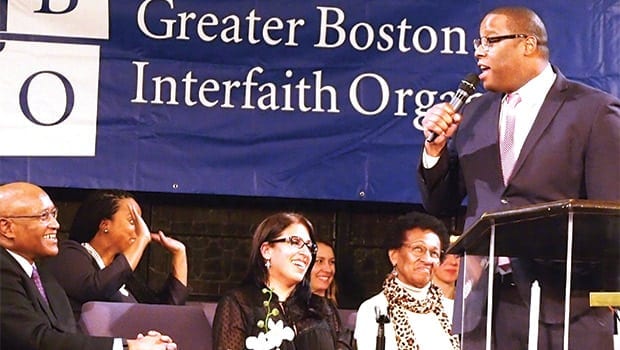Senate president supports criminal justice reforms
Interfaith group GBIO seeks support for housing, Affordable Care Act

It’s been a long haul.
Last December, activists briefly disrupted a meeting of legislative leaders in protest of a criminal justice reform push they said wouldn’t go far enough to ameliorate racial disparities in sentencing and reduce the number of non-violent offenders serving hard time.

Senators William Brownsberger, Stanley Rosenberg and Sonia Chang-Diaz, state Rep. Russell Holmes and Bethel AME Pastor Ray Hammond during a meeting of the Greater Boston Interfaith Organization at Hammond’s Jamaica Plain church.
In January, Second Suffolk District Sen. Sonia Chang-Diaz called out legislative leadership during a Martin Luther King Jr. memorial breakfast in which she made a forceful plea for action on substantive reforms.
But last week legislative action seemed imminent when state Senate President Stanley Rosenberg committed to work for legislative fixes supported by the Greater Boston Interfaith Organization, including pretrial bail reform, the elimination of mandatory minimum sentences for nonviolent drug offenders, the elimination of excessive fees and fines and the elimination of excessive use of solitary confinement.
“This is the time,” Rosenberg said during a meeting held at Bethel AME Church in Jamaica Plain that drew more than 800 GBIO members. “We are a close as we’ve ever been.”
Chang-Diaz, who attended the GBIO meeting along with Sens. Linda Dorcena Forry and William Brownsberger and state Rep. Jay Kaufman, echoed the frustration criminal justice reform activists expressed at the Council of State Governments meeting in December when the nearly all-white group of legislators and policy makers was criticized for its incremental approach.
“They’re issuing a report that has nothing to do with racial and ethnic bias and has no sentencing reform,” she said. “I’m done with waiting.”
As Chang-Diaz pointed out, legislative leaders, including former Senate President Theresa Murray, agreed to take up mandatory minimums for nonviolent drug offenders in 2012 in exchange for support for a controversial “Three Strikes” bill that triggers life sentences for repeat violent offenders.
“It’s 2017 and we have not taken up that issue,” she said.
Kaufman, whose district includes Lexington and western metro-area towns, told the Banner that the Massachusetts Sentencing Commission recommended the elimination of mandatory minimum sentences for nonviolent offenders during his first term in office in the 1990s.
“That was 20 years ago,” he said. “It’s astounding to me that we still have to fight this battle. Astounding and very disappointing.”
In his remarks to the GBIO members, Rosenberg said the CSG recommendations will not represent the full extent of the reforms the Legislature takes up this year.
“The Council of State Government is part of the process,” he said. “It’s not the be-all and end-all.”
He told the audience the Senate would “do everything possible” to make meaningful reforms to criminal justice policy.
GBIO members committed to writing and calling their legislators to press for the group’s package of criminal justice reforms.
Health care
GBIO members pledged to work in support of the Affordable Care Act, better known as Obamacare, and fight a rumored plan from Congressional Republicans to cut Medicaid funding. GBIO members also pledged to reach out to friends and family members in nine states with Republican Senators and ask for a “no” vote on the repeals of the ACA.
“If only three of them decide to have a spine and stand up to the political leaders in their party, the repeal won’t happen,” said Health Care For All interim Director Stephen Rosenfeld, addressing the GBIO membership.
Community Reinvestment Act
City councilors Andrea Campbell, Ayanna Pressley and Tito Jackson pledged to work to ensure that Boston residents who are representative of the city’s communities of color and nominated by the Yes for a Better Boston Coalition be selected to fill four of the nine seats on the Community Preservation Committee — a group that will make decisions on spending the estimated $16 to $20 million in revenue generated by the Community Preservation Act.
That money comes from a CPA-mandated small surcharge on Boston property taxes, which is to be earmarked for affordable housing, open space and historic preservation projects.
“We want to hear from our city councilors that they will be partners with us in appointing the right people,” said GBIO Strategy Team member Jumaada Abdal-Khallaq Smith.
Pressley said the councilors are committed to working to increase affordable housing.
“We are one, our cause is one and we must work together if we are to succeed,” she said.
GBIO members pledged to attend a City Council hearing on the Community Preservation Committee, slated for Monday February 13.







